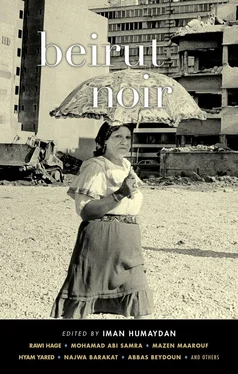Muhammad Abi Samra - Beirut Noir
Здесь есть возможность читать онлайн «Muhammad Abi Samra - Beirut Noir» весь текст электронной книги совершенно бесплатно (целиком полную версию без сокращений). В некоторых случаях можно слушать аудио, скачать через торрент в формате fb2 и присутствует краткое содержание. Город: New York, Год выпуска: 2015, ISBN: 2015, Издательство: Akashic Books, Жанр: Детектив, на английском языке. Описание произведения, (предисловие) а так же отзывы посетителей доступны на портале библиотеки ЛибКат.
- Название:Beirut Noir
- Автор:
- Издательство:Akashic Books
- Жанр:
- Год:2015
- Город:New York
- ISBN:978-1-61775-344-2
- Рейтинг книги:3 / 5. Голосов: 1
-
Избранное:Добавить в избранное
- Отзывы:
-
Ваша оценка:
- 60
- 1
- 2
- 3
- 4
- 5
Beirut Noir: краткое содержание, описание и аннотация
Предлагаем к чтению аннотацию, описание, краткое содержание или предисловие (зависит от того, что написал сам автор книги «Beirut Noir»). Если вы не нашли необходимую информацию о книге — напишите в комментариях, мы постараемся отыскать её.
Most of the writers in this volume are still living in Beirut, so this is an important contribution to Middle East literature — not the “outsider’s perspective” that often characterizes contemporary literature set in the region.
Beirut Noir — читать онлайн бесплатно полную книгу (весь текст) целиком
Ниже представлен текст книги, разбитый по страницам. Система сохранения места последней прочитанной страницы, позволяет с удобством читать онлайн бесплатно книгу «Beirut Noir», без необходимости каждый раз заново искать на чём Вы остановились. Поставьте закладку, и сможете в любой момент перейти на страницу, на которой закончили чтение.
Интервал:
Закладка:
He turns left, going up toward Hamra Street. He passes Stars, the shop for musical instruments that somehow hasn’t yet closed down. The imposing thick, white iron door next to Stars had been the entrance to a video shop that his brother’s friend ran. It had lasted only two years before it closed. He continues a little farther, looks to his right, and then raises his head. That’s where his childhood friend Manal lived, up on the top floor of the large building on the corner where the bar Under Water used to be. That’s the first bar he ever entered and cast aside his self-consciousness around women. He remembers that the bar was through the second door after the main entrance to the building. The shop between the two doors sold used English-language books. Rashid was a shy boy, particularly self-conscious around women, and didn’t brag about his wet dreams like his friends did. He would secretly rent adult films from the video shop near the bar so no one would discover his secret; meanwhile his friends, the other boys in the neighborhood, would watch the films together in one of their bedrooms, when their parents were out, of course. In the bar Under Water, Rashid abandoned his shyness about women’s bodies, touching their secrets. His imagination was transformed there into flesh and blood, into stories words couldn’t relate, indeed into the curves of “Lilly’s” body. He remained self-conscious in front of Lilly both before and after they sat together. Only when she dragged him behind the wine-colored curtain in the back of the bar and put his hand between her breasts then moved it all over her body did he forget his shyness. He used to plan his trips to the bar on the weekends when Manal was away from Beirut with her family, at their house in the mountains.
In her East Side apartment on the top floor of the Sarmad Building, his childhood friend Manal committed suicide. She was twenty-two. During that time, he was practically living in the university library. He had passed his medical school exams. He hadn’t seen her in months. At their last meeting in the Three Roses café, she seemed enthusiastic about a project renovating the interior of a clothes shop, showing him her designs. He noticed that she was calmer than usual. He thought that she had grown up and left behind the tumult that glistened in her eyes. Then came the news one Sunday morning. He was eating breakfast. He remembers every detail of the scene: His house phone rang. His friend Nader was on the line, a mutual friend of his and Manal’s. Nader was sobbing. How did she get the rope? Where did she find the strength to tie it around her delicate neck? How did no one in the house notice that the sounds coming from her room weren’t normal? She locked the door with a key and claimed that she would need some time alone, that she wanted to read without anyone disturbing her. She prepared carefully for her last night. She pulled the rope around her neck and jumped into the unknown. She ended. Since that day, he had put off thinking about what happened. He imagined her neck all blue and purple, and her face bloated with absence. He didn’t want to explore the details; he didn’t want to review their friendship in order to understand the reasons that she terminated her life.
He walks as though taking revenge on his memory. He takes big footsteps. The face that changed him appears once more to him. Yara. Her name is Yara. Her name suggests another place and time, before they came together. She must stay here, in the world that brings the two of them together. He can’t explain his obsession with her. But he’s dying to know everything about her. What was she doing in that alleyway? He knew she didn’t live there. He’d met her mother. He was self-conscious in front of her agony and completely understood it, even before glimpsing her face. He had an understanding of the suffering of patients’ relatives, but deep within himself he ignored this suffering. Her mother was in a state of hysteria. She oscillated between anger — which she translated to him through a torrent of insults directed against the country and its people — and sarcasm, which would sometimes prompt banter and laughter about her condition and that of her daughter. He saw no other family members, only her mother. He wished he could sit next to her, hold her hand, and transmit to her some of the warmth he felt toward her. He loved the sallowness of her face and lips, he knew them, he knew the shape of her eyes and the nightdress that covered her skin. He had seen her before, in that dream he can’t forget. He dreamed it before he saw her, before he was afflicted by the ever-present disease of fear.
He dreamed about a chair that he put next to her bed in the intensive care unit. Now he walks, holding her hand bound with tubes that provide her with life.
He walks in his Beirut. This city is like a giant village, a village unlike any other village, or any other city. He used to say that despite its new ugliness, Beirut still enjoys a certain charm that he doesn’t know how to explain. He doesn’t say this anymore. During his walk he searches for a charming setting. By day he tends to move between less ugly parts of the city and those with actual charm, if that’s the right way to put it. He lives in what are called Beirut’s “bubbles.” There are neighborhoods in the city he hasn’t visited since he was a schoolboy at the end of the seventies and the beginning of the eighties; there are other neighborhoods he’s never visited at all.
He carries Yara with him, perhaps he doesn’t feel afraid for her. How can he fight fear when it is percolating inside him, becoming a part of him? Perhaps it is a temporary state. He saw her wounded face in his dream before he saw her in real life. In the hospital he succeeded in hiding his shock. Then when he was alone, his obsessions and fears were born. Was the day’s exhaustion enough to make him hallucinate or was he experiencing the symptoms of some disease? He raises his hand to his face, then sticks it on his forehead. He needs to sleep. Perhaps he will wake up tomorrow and have lost this terrible fear. He needs to pass by and see her tomorrow, because he is the surgeon who saved her from death as her mother keeps saying. He laughs. What kind of savior-hero do others think he is? What kind of savior-hero does he himself think he is? He walks. He is no longer able to move quickly. Tomorrow he will see her. Will she regain consciousness tomorrow? Perhaps he’ll wake up tomorrow and be cured from this disease, from this beautiful curse.
He walks right through the chaos of a long Beirut night. He listens to the distant sounds of fireworks, as if they’re faraway explosions that keep repeating. This violence is the expression of joy; this violence is the expression of all kinds of emotions. He is walking through Beirut while it’s shedding the veneer of civilization. How can a respected doctor like him be so lost? He walks quickly like a man searching for his mind. He tells himself that tomorrow he will resist her pallid face and closed eyes. He will resist her lips that are searching for the kiss of life. Tomorrow he will resist fear. Why is he now fighting against night and its mysteries? He should go up to his apartment to collect himself before sleeping. He misses dreamless sleep, unless Yara decides to visit him. What is this loss that tortures him? He feels her lying beside him. She is here sleeping in his bed just like she is sleeping in the hospital — absent, infatuated with absence, haggard, and beautiful. He wants to sleep, and doesn’t want tomorrow to be like today. This is what he’s gotten used to in Beirut. This is what he learned from it. He should sleep now to live tomorrow, another Beirut day.
In the morning he has to shower quickly. He has to be at the hospital before eight. He doesn’t think while putting on his clothes. He’s still exhausted from wandering around yesterday. He is also afflicted by the exhaustion of the long years that came before this. He glances up at the sky as he leaves the building. The Beirut sky is so beautiful! The color of the sky here is spectacular. He looks up the whole time walking from home to the hospital. When he turns left the dogs bare their teeth. They arrived early from their morning excursion and have already started their security patrol. The dogs are in charge, he has to smile at them and fully acknowledge their extraordinary capabilities and their terrifying appearance.
Читать дальшеИнтервал:
Закладка:
Похожие книги на «Beirut Noir»
Представляем Вашему вниманию похожие книги на «Beirut Noir» списком для выбора. Мы отобрали схожую по названию и смыслу литературу в надежде предоставить читателям больше вариантов отыскать новые, интересные, ещё непрочитанные произведения.
Обсуждение, отзывы о книге «Beirut Noir» и просто собственные мнения читателей. Оставьте ваши комментарии, напишите, что Вы думаете о произведении, его смысле или главных героях. Укажите что конкретно понравилось, а что нет, и почему Вы так считаете.












